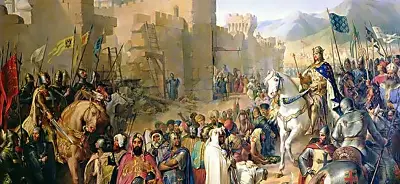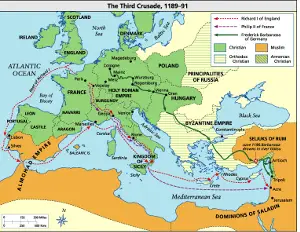The Crusades
Part 3: Third Crusade and the End
The loss (again) of Jerusalem resulted in another call to arms, from Pope Gregory VIII, and this became the Third Crusade. Leading the charge this time around were two kings and an emperor, three of the most famous names in the West at the time: Frederick I Barbarossa, King of Germany and Holy Roman Emperor; Philip II, King of France; and Richard I, King of England.
The Third Crusade nominally lasted three years; but, despite the presence of a large and well equipped Crusader army, this Crusade ended in frustration, at least as far as its ultimate goal. For a start, Frederick Barbarossa drowned before the armies even got to the Holy Land, and the dismayed German forces left for home. Richard himself had some success. He and his men captured Messina, a city on the island of Sicily, in 1190; in the process, he rescued his sister Joan, who had been married to the King of Sicily and, when he died, had been taken captive by the new king. The following year, Richard's force took the island of Cyprus. The English and French forces also seized the crucial city of Acre, in July 1191, Richard finishing off a siege begun by Guy of Lusignan, who then took over as King of Cyprus. One story of the struggle at Acre had Richard, debilitated from scurvy, being carried on a stretcher, wielding a crossbow to pick off guards on the walls. 
Richard and his forces defeated Saladin's army at Arsuf in September and then took Jaffa in November. Richard's army was within storming distance of Jerusalem, twice, but the French force had left for home and he had lost too many men to take the city and ended up negotiating a treaty with Saladin, which allowed for safe passage for Christian pilgrims into Jerusalem and for Western armies to maintain control of a small piece of land around Acre. Richard headed for home. In 1192, the ship he was sailing on wrecked and Richard was forced to try to go home over land. He was captured and taken prisoner by Duke Leopold of Austria, whom Richard had personally offended by defacing Leopold's personal flag at Acre. Henry VI, the new Holy Roman Emperor, had no such compunction to be an ally of Richard (as had his predecessor, Frederick Barbarossa) and, in fact, kept him captive, demanding a massive amount of money as ransom. England paid it, finally. Pope Innocent III called for a new Crusade in 1198. By this time, Western powers and the Byzantine Empire were mired in a political struggle. The Fourth Crusade proceeded as a mission to oust the current Byzantine emperor, Alexius III, and replace him with another ruler, his nephew, who became Alexius IV. The Crusaders ended up declaring war on the fabled city of Constantinople and captured it in 1204, celebrating by engaging in pillage and plunder on a grand scale. The Fifth Crusade occurred in 1216, again in response to a call by Pope Innocent III. The focus was Egypt; and despite a joint attack on land and from the sea, the Crusader army was defeated, send packing by a strong Muslim army led by Al-Malik al-Kamil, nephew of Saladin. Another Crusade, the Sixth, occurred in 1229 and resulted in the peaceful transfer of Jerusalem from Muslim control to Christian control. After the peace treaty expired a decade later, a Muslim army retook the city. King Louis IX of France organized the Seventh Crusade, again targeting Egypt. Western armies strived from 1248 to 1254 to take control, but they were defeated. The Eighth Crusade, in 1270, had as a goal confronting a new enemy, the Mamluks, who in 1260 had defeated the mighty Genghis Khan and his Mongol Army at Ain Jalut (The Mongols would never again try to invade the Middle East.) and, eight years later, ravaged Antioch. This Crusade had little success. What is considered the last significant Crusade was the Ninth, organized by England's King Edward I in 1271. The result was much the same as other Crusades. The 1291 fall of Acre to the Mamluks is considered by many historians to be the official end of the Crusades. Many other battles pitting members of one religion against another took place during the time of the Crusades. One of the most well-known was a series of battles in Northern Europe that are often called the Northern Crusades. Pope Alexander III authorized campaigns in Livonia and Prussia against Baltic people whom the Western Christian establishment church considered pagans. These Crusades went on for several decades. Next page: Other Crusades > Page 1, 2, 3, 4, See also Warfare during the Crusades |
|
Social Studies for Kids
copyright 2002–2024
David White





